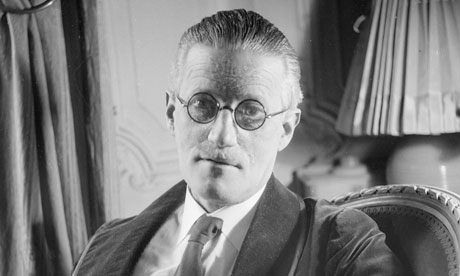We measure our lives with unread books – and 'difficult' works can induce the most guilt. How should we view this challenge?

Samuel Beckett said of James Joyce's
Finnegans Wake … 'It is not only to be read. It is to be looked at and listened
to.' Photograph: Lipnitzki/Roger Viollet/Getty Images
There was a time when a
learned fellow (literally, a Renaissance man) could read all the major extant
works published in the western world. Information overload soon put paid to
that. Since there is "no end" to "making many books" – as the Old Testament book
Ecclesiastes prophesied, anticipating our digital age – the realm of the unread
has spread like a spilt bottle of correction fluid. The librarian in Robert Musil's The
Man Without Qualities only scans titles and tables of contents: his library
symbolises the impossibility of reading everything today. The proliferation of
lists
of novels that you must, allegedly, have perused in your lifetime, reflects
this problem while compounding it. On a recent visit to a high street bookshop,
I ogled a well-stacked display table devoted to "great" novels "you always meant
to read". We measure out our lives with unread books, as well as coffee spoons.
The guilt and anxiety
surrounding the unread probably plays a part in our current fascination with
failed or forgotten writers. Hannah Arendt once
wondered if "unappreciated genius" was not simply "the daydream of those who are
not geniuses", and I suspect there is indeed a touch of schadenfreude about this
phenomenon too. On the book front, we could mention Mark O'Connell's Epic
Fail, the brilliantly idiosyncratic Failure, A
Writer's Life by Joe
Milutis, and Christopher
Fowler's Invisible Ink: How
100 Great Authors Disappeared, based on the longstanding
column in the Independent on Sunday. Online, there is The New Inquiry's Un(der)known Writers
series, as well as entire blogs – (Un)justly (Un)read, The Neglected Books Page, Writers No One Reads – devoted
to reclaiming obscure scribes from oblivion. One of my personal favourites is The Biographical Dictionary of Literary
Failure, which celebrates the lives of writers who have "achieved some
measure of literary failure". The fact that they all turn out to be fictitious
(à la Félicien
Marboeuf) and that the website will vanish after a year, make it even more
delightful. I recommend the tale of Stanhope Sterne
who, like TE Lawrence, lost a
manuscript on a train – at Reading, of all places: "Is there, I wonder, some
association with that dull junction's homonym, that it is a writer's fear of
someone actually reading their work that causes these slips?"
No comments:
Post a Comment